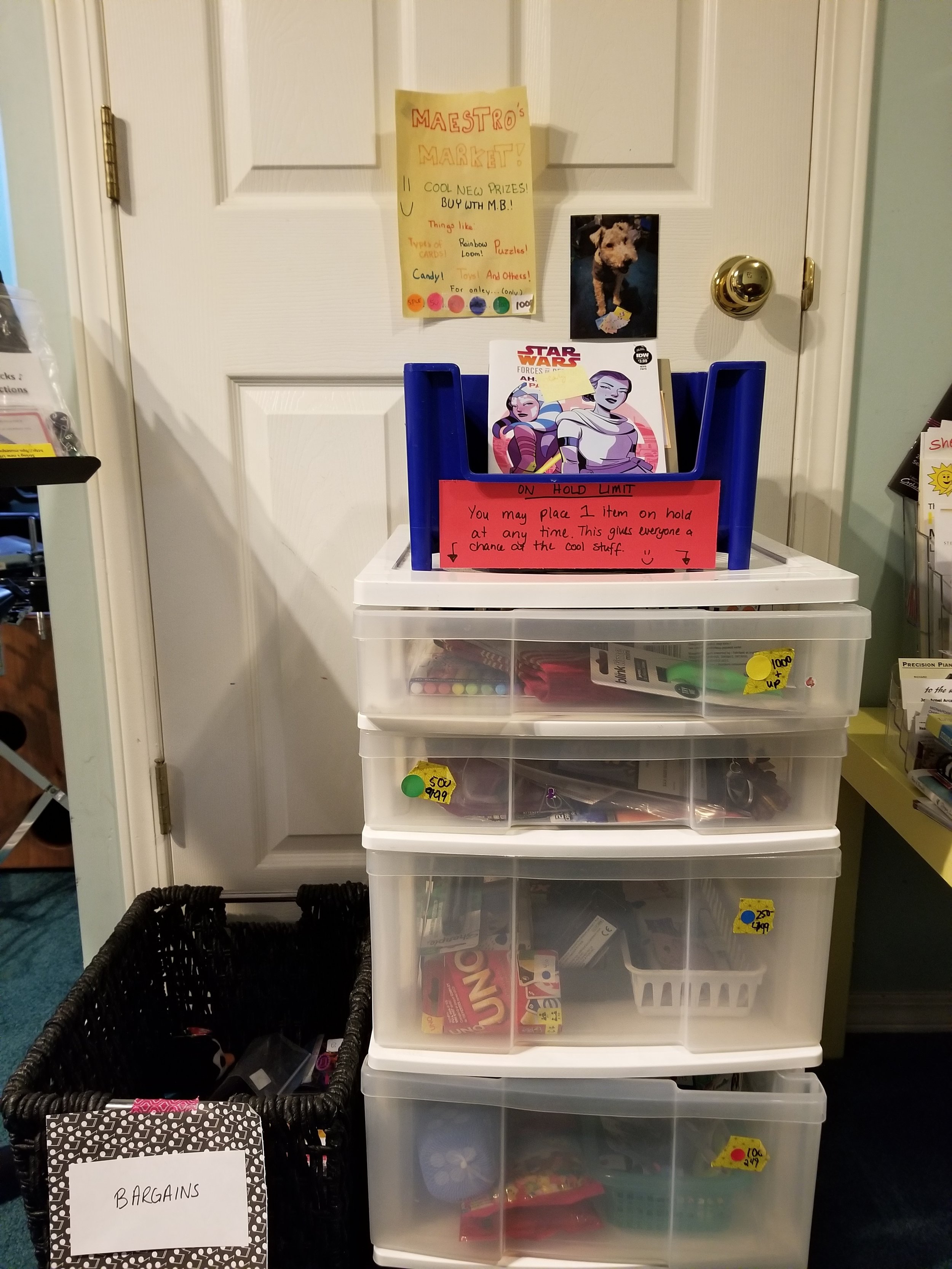Towards the end of summer, I thought about what improvements to make to Maestro’s Top Dogs, my student incentive program that still bears Maestro’s name. Students earn Maestro Bucks throughout the year, which they can spend on prizes at Maestro’s Market.
Maestro’s Market - full of fun prizes that range from $1 to $15. Credit: R-M Arca.
During my brainstorming, the following themes came through: technique, ear/rhythm/sight-reading, and practice frequency. To be honest, those are the key themes every year, but these are areas I really want my students to shine in this year. So, I had to tweak the student challenges and incentives a bit.
Maestro’s Technique Challenge
Those who knew Maestro knew that he was really picky about piano technique. If you had one too many stumbles in your scales, chords, or arpeggios, he stomped out of the studio, only to return when he heard something that pleased him. As you can see here, Maestro didn’t make an exception for me:
In my brainstorming bubbles, I jotted down, “Don’t send them home until their fingering doesn’t suck.” To accomplish this, we are going to focus on only one or two technical exercises in a lesson (more if this is a strong area for them). My students will have to clear “Play with correct notes and fingering,” challenge at the lesson. I have them work on different ways to play that exercise as they try to clear that first challenge, varying the articulation, tempo, touch, rhythm, and dynamics. My students may not be thrilled that we are going to spend more time on technique in the lesson, but at least they’ll have a better idea of how to practice it at home; and I can feel a bit more confident that even if they only get to it once or twice at home, fingering and/or notes should hold.
The other challenges are: play hands separately, play hands together, play at a steady tempo and play at the minimum required tempo for their playing level. Some students have cleared two or three challenges already for the exercise of the week. Others - it will take a few weeks at first. In the end, practising them at home should become easier since we’ve tackled the hardest part in the lesson.
Students will earn Maestro Bucks (MB) for each cleared exercise, for each key, commensurate with their playing level (Beginners - Grade 2: $5 MB/challenge, Grade 3 - 6: $10 MB/challenge, Grade 7+: $20/challenge).
Maestro’s Music Moxie Challenge
I don’t think I altered this from last year. Students will earn Maestro Bucks in the following ways:
Each time they add to their Bulletproof Musician Playlist, which is their go-to set list of mastered repertoire ($10 MB/beginner - Pre-Grade piece, $20 MB/Grade 1 - 5 piece, $40 MB/Grade 6 - 8 piece, $50 MB/advanced piece),
$20 MB per solo or collaborative piano performance
Each piece that is memorized (same breakdown as the Bulletproof Musician Playlist)
$25 MB for each concert/music review they submit,
$25 MB for each composition or arrangement they do.
Maestro’s Practice Challenge
I think this is going to be the hardest challenge for all of us, but not impossible.
Inspired by various colleagues who launched 100 Days of Practice Challenges in their studios, I decided to set up something similar. However, we’re going to work our way up to it, starting with a 30 Days of Practice Challenge and a 60 Days of Practice Challenge.
The basic premise of all these challenges is the same: you must commit to practising music every single day, except for when you’re too sick to get out of bed. Some teachers actually specify a recommended practice time. I’m not going to as for me, it’s the practice frequency that I want to see improvement on. Any artist, athlete, and budo practitioner will tell you that it’s the repetitions and practice frequency that results in consistency and steady progress.
I know just as well as the next person that it’s impossible to commit to practising the same amount of time, seven days a week. Some days are going to be short practices. Some will have to take place far away from the piano (e.g. travelling to Hawaii).
After my students’ eyes boggled at the idea, I told them that there’s actually a lot of wiggle room. If they don’t have a lot of time to practice, or are away from the piano, they can get their daily practice in by:
doing a bit of music theory
do a music puzzle
work on music games/apps like Note Rush, Music Note Flashcards, Simply Music, Perfect Ear, Noteworks, Flashnote Derby, Tenuto, etc.
listen to their pieces
scorestudy (look at the patterns, structure, markings, etc.)
clap out the rhythms to their songs
read about a composer
ask someone to quiz them on their music knowledge (key signatures, vocabulary, etc.)
If they miss a day, my students have to restart the count. As I said, if they’re too sick to get out of bed, then that doesn’t affect the count. Stay in bed and get well first.
My students will have to do a better job at tracking their practising this year. It’s no big deal for the ones who are good at keeping a practice log. I did wrack my brains to figure out something easy peasy for those who aren’t good at keeping a practice log. The Practice Buddy app was what I found.
Practice Buddy is a free app available for iOS and Android devices. Literally, the hardest part is deciding how to set up your practice cards. Then, the rest is like magic. Students have to click on a practice timer. But here’s the best part: students can record one minute of their practice session and it pops up on my phone to review it and provide feedback (and stickers). Check out my videos below on how to set up Practice Buddy:
I do have some students who asked for a paper Practice Diary. I did design one just in case.
With the practice timer, students will be forced to learn how to manage their time more effectively. You can have an extremely productive, mindful 10-minute practice, and a crappy 60-minute practice. It comes down to setting specific goals for your practice, and being mindful when you practice.
Also, I decided to join them on this challenge as well. Here’s hoping that I practice my second, third, and fourth instruments more regularly. When it comes to the 100 Day challenge, I think I’ll follow Hilary Hahn’s format on Instagram.
Check out what my colleagues have done with their 100 days of practice challenges:


